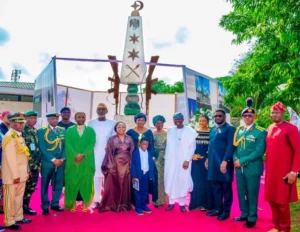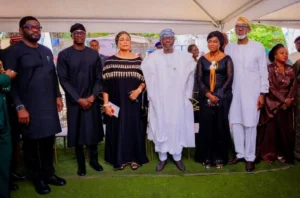EVENTS
Igba Nkwu Nwanyi: All You Need to Know About the Igbo Traditional Marriage, Using Uturu as a Case Study
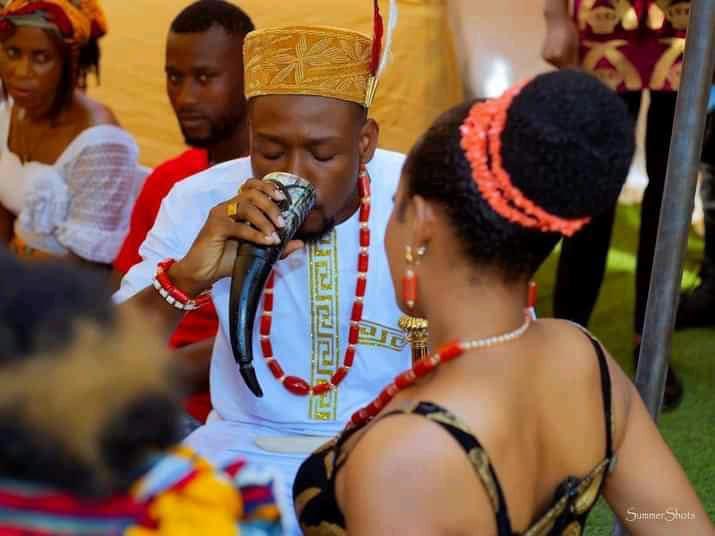
Unfortunately, Igbo tradition doesn’t recognize the modern kind of proposal where the man gets down on one knee and proposes to his girlfriend.
Marriage is very important in Igbo culture, and the traditional rites attached to the union aren’t taken lightly by the families involved.
Traditional Igbo marriages are deemed very festive, colorful, and are divided into four main parts:
1. Marriage inquiry known as ‘Iku aka’ or ‘Iju ese’
2. Seeking consent from the bride-to-be’s extended family, known traditionally as ‘Umunna’
3. Bride price negotiation
4. Wine-carrying ceremony by the bride, known as ‘Igba Nkwu Nwanyi’
All these must be completed, and the bride’s family must be satisfied before the groom can take his new wife home.
1. Marriage Inquiry Known as ‘Iku Aka’ or ‘Iju Ese’
Tradition doesn’t recognize the modern kind of proposal where the man gets down on one knee and proposes to his girlfriend. The first step of the Igbo traditional wedding rites is the groom visiting the bride’s immediate family, accompanied by his father or the eldest member of his family if his father is deceased. Usually, they are meant to show up empty-handed because ‘Iku aka’ or ‘Iju ese’ simply means ‘coming to knock or inquire,’ but the groom and his family are free to take some hot drinks and kola nuts as a gesture of goodwill.
The groom’s father does the talking; he introduces himself to the bride’s parents or guardian, explains the purpose of his visit, and officially announces his son’s interest in marrying their daughter. The bride-to-be is then called out by her parents and asked if she knows her suitor and would like to marry him. Her response determines if they will proceed to inform the extended family and begin the bride price negotiation.
2. Seeking Consent from the Bride-to-Be’s Extended Family, Known Traditionally as ‘Umunna’
After the first visit, the bride’s family begins an investigation of the groom’s family. They check their background and history (hereditary illnesses, bad behaviors, divorce, fertility, etc.). This investigation determines the progress of the next meeting between both families, as the bride’s family will decide if the groom-to-be is suitable to take care of their daughter and future children. It is also assumed that the groom’s family must have conducted a similar investigation prior to the first visit.
The next meeting will be between the groom’s family (which can include up to 20 people) and the bride’s extended family, known as ‘Umunna’. This meeting is important because the groom’s family must restate their interest in marrying from their family. The groom first needs to get the consent of the bride’s extended family and then the final consent from the bride. Dates for the traditional wedding will be set, and a bride price list will be sent out. In Igboland, tradition dictates that the groom bring a few gifts (such as kola nuts, palm wine, beer, soft drinks, tobacco, snuff, and a goat). These will be shared between the groom’s and the bride’s families.
3. Bride Price Negotiation and Payment, Known as ‘Ime Ego’
After the second visit and once consent has been given by the bride’s extended family, the groom’s family can proceed with the bride price negotiation and payment, known traditionally as ‘Ime ego’. The groom’s family asks for the engagement gifts list, which varies slightly from place to place in Igboland.
The money paid for the bride price is significantly small and can be as low as N30; it isn’t an indication of the bride’s worth. The extra gifts make up the larger part of the bride price. The groom’s family then presents all they’ve bought to the bride’s family on an agreed date or on the day of the wine-carrying ceremony.
‘Ime ego’ can be a hectic process between both families, with a lot of begging from the groom’s side and a lot of bragging from the bride’s side. The bride’s family lists their daughter’s accomplishments and what the groom-to-be will gain by marrying her. There will be a lot of back and forth between both families until a set amount is reached.
4. Wine-Carrying Ceremony by the Bride, Known as ‘Igba Nkwu Nwanyi’, and ‘Idu Ụlọ’
This is the final rite done by the groom’s family. After the date for the official wine carrying has been set, the ceremony is held at the bride’s home. Her family prepares a large feast (depending on their means) for the groom’s family and invited guests. They may also hire a live band and traditional dancers to make the ceremony interesting. Usually, the bride-to-be is dressed in traditional Igbo wedding attire, which includes a blouse, a double wrapper, a red coral bead necklace, and a large head tie known as ‘Ichafu’ or a bead around her head.
The groom is expected to be accompanied by a larger party this time (including friends) and bring along the bride price list. He must present the list along with the required gifts to the Umunna before the ceremony begins.
The highlight of ‘Igba Nkwu Nwanyi’ is when the bride publicly identifies the man she wants to marry. The bride’s father or eldest uncle (if her father is deceased) traditionally prays for the bride, blessing her future marriage. He then gives her a cup of palm wine (usually placed in a gourd) to find the man she intends to marry. The bride, along with her maidens, searches for her groom in the crowd, as other men and the groom’s friends beckon her to give them her wine. Once she finds her groom, she offers him the drink, kneeling down. If he takes a sip, it signifies to the crowd that he is her husband; acceptance means they are officially married. The groom and bride then dance to meet her parents, who pronounce blessings on them. The merriment begins, and the couple receives gifts from friends and family.
‘Idu Ụlọ’ comes immediately after ‘Igba Nkwu’. At this stage, the bride visits the groom’s home for the first time, accompanied by a maiden or her unmarried sister to keep her company. Before she begins her journey, the bride’s family gifts her items she’ll need to start her new home, including cooking utensils, bed sheets, suitcases, boxes, a sewing machine, a bed, pillowcases, plates, clothes, and other essential items. The bride’s sister or family returns home after a few days to give feedback to her family.
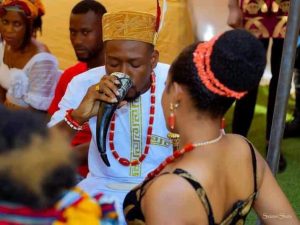
EVENTS
Sanwo-Olu attends 50th memorial ceremony for General Murtala Muhammed
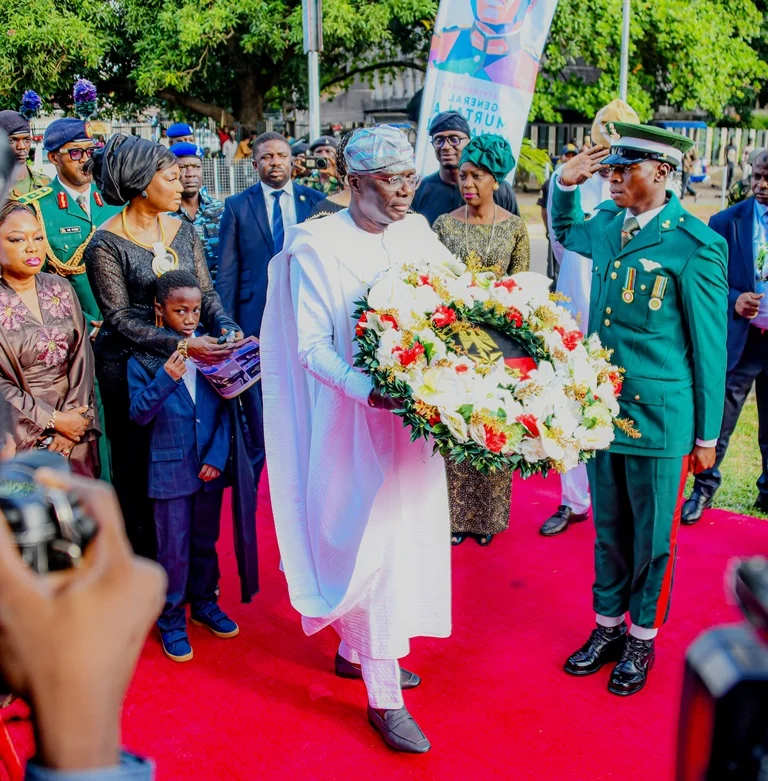
Governor Babajide Sanwo-Olu of Lagos State on Friday participated in a wreath-laying ceremony marking the 50th anniversary of the death of the late General Murtala Ramat Muhammed, GCFR.
The event was attended by notable dignitaries, including Senator Daisy Danjuma, wife of retired Lt. General Theophilus Danjuma; Dr Aisha Muhammed Oyebode, daughter of the late General and CEO of the Murtala Muhammed Foundation; her husband, Gbenga Oyebode; and Hon. Bola Oladunjoye, Chairman of Ikoyi-Obalende LCDA, among other officials and guests.
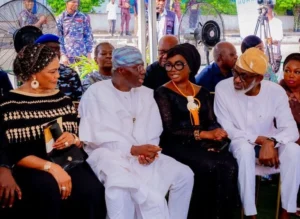
Wreaths were laid at the cenotaph in honour of General Muhammed, celebrating his life, leadership, and enduring contributions to Nigeria.
General Murtala Ramat Muhammed served as Nigeria’s Head of State from July 1975 until his assassination on February 13, 1976.
EVENTS
GOVERNOR SOLUDO’S ULTIMATUM AND THE BATTLE FOR ANAMBRA’S MONDAYS, SHUTS DOWN ONITSHA MAIN MARKET FOR A WEEK
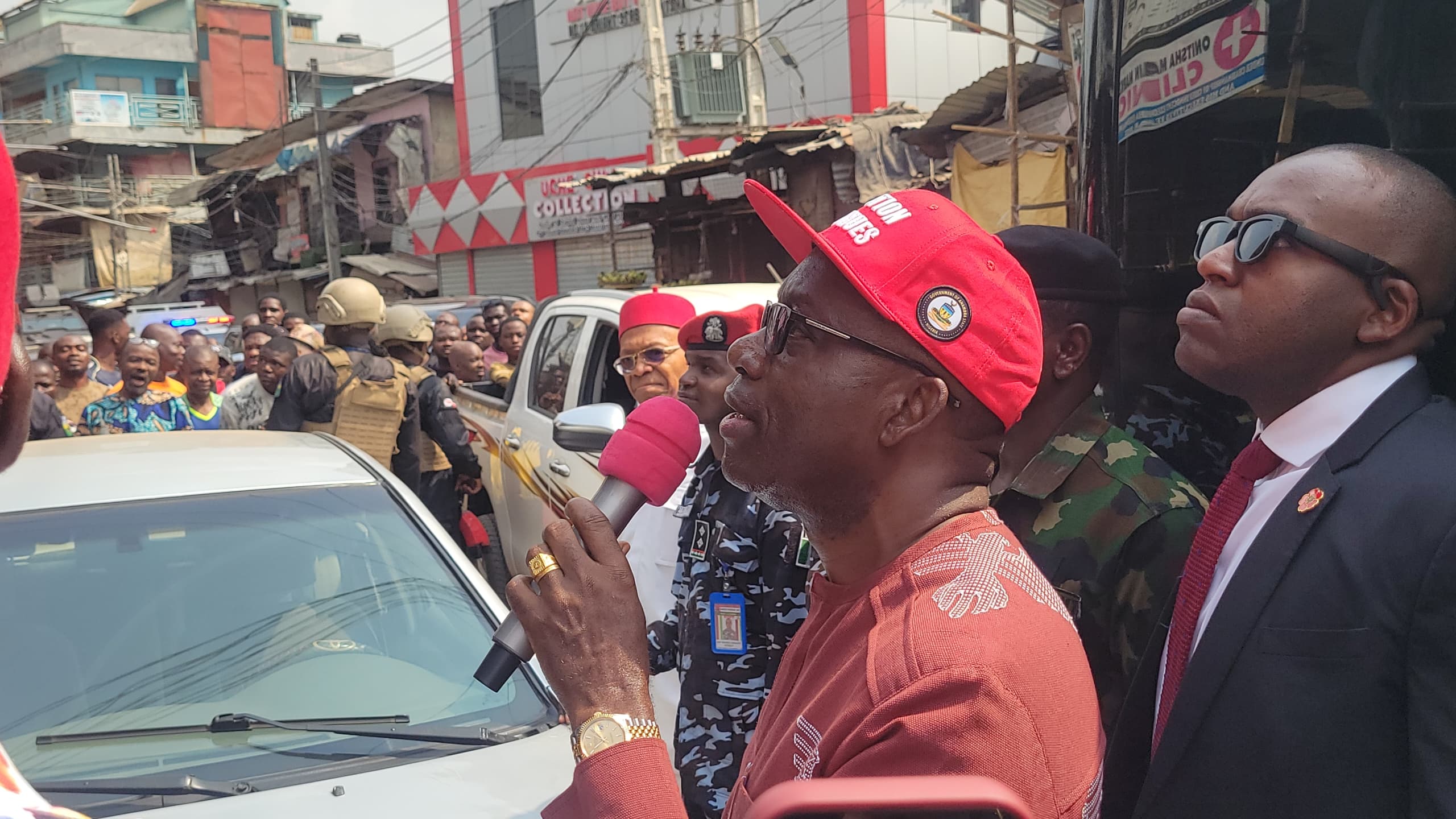
By Christian ABURIME
Anambra State Governor, Prof Chukwuma Charles Soludo has ordered the immediate shut down of the Onitsha Main Market for one week, following defiance of the market leadership to open, against government directive.
Governor Soludo’s order for a one-week shutdown of the sprawling market is more than an administrative penalty. It is the latest, and perhaps most drastic, salvo in a protracted war over who controls time and economic life in Southeast Nigeria on mondays. The enemy is the long-standing, fear-enforced Monday sit-at-home order, a ghostly mandate from non-state actors that has strangled businesses and normalized weekly monday sit-at-home for years.
The Governor’s move is a direct response to what the government sees as baffling defiance. Despite repeated assurances of enhanced security and appeals to reclaim public spaces, many traders at the iconic market again chose to keep their stalls locked. Their absence was a quiet rebellion, but one that spoke volumes about the lingering climate of apprehension.
“The government cannot stand by while a few individuals willfully undermine public safety and disregard official directives meant to restore normalcy, this is plain economic sabotage. We are not going to allow this”, Governor Soludo stated, framing the closure as a protective measure for the “law-abiding citizen.” But his subsequent warning carried the weight of an escalating ultimatum: if the market does not reopen for business after this one-week shutdown, it will be sealed for a month. “And so on and so forth,” he added, drawing a line in the sand.
“You either decide that you are going to trade here or you go elsewhere. I am very serious about this”, the Governor insisted.
The scene at the market was one of tense enforcement. A joint task force of police, army, and other security personnel moved swiftly to secure the perimeter, turning away the few hopefuls who approached.
For the Soludo administration, the solution is unwavering enforcement to break a psychological barrier. The strategy is clear: make the cost of compliance with the illegal sit-at-home order higher than the fear that drives it. By targeting the economic heart of the region, the government aims to trigger a collective shift in behavior, betting that the traders’ desire to trade will ultimately outweigh their fear.
As the gates remain locked this week, the standoff in Onitsha encapsulates the broader struggle in the Southeast. It is a fight over normalcy, authority, and the fragile psyche of a populace caught between enforced directives and imposed orders. When the gates are scheduled to reopen next Monday, all eyes will be on the traders. Will they return to their stalls, emboldened by the state’s show of force? Or will the silent, empty aisles deliver a different verdict?
The answer will determine not just the fate of a market, but the rhythm of life in Anambra for Mondays to come.
https://www.instagram.com/reel/DT-PAX-DIAi/?igsh=bzVxOGgzcTF0OG5k
EVENTS
Man Goes Viral After Posting 17-Year Throwback Photos Of Him And His Wife
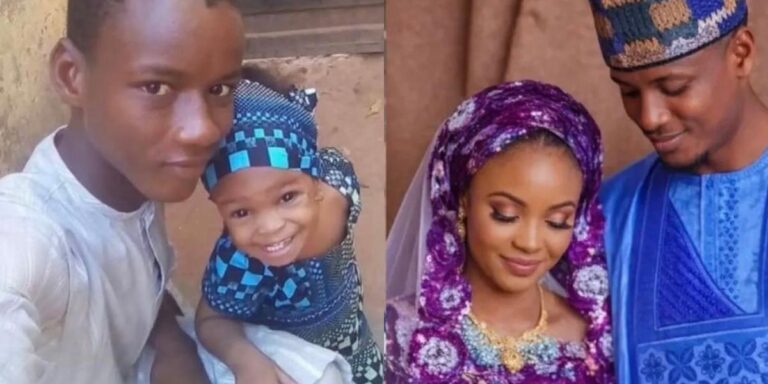
A Nigerian man has gone viral on X (formerly Twitter) after sharing throwback photos of himself and his wife from when they were both still children.
In the post, @Sadeeq_Malo revealed that he has loved his wife for 17 years, describing her as his uncle’s daughter, a statement that immediately caught the attention of social media users.
Sharing the photos, he wrote:
“17 years of love. I fell in love with her from the day she was born — my uncle’s daughter, now my bride. Allahummah Barik.”
The old photos, which show the couple as children, were shared alongside recent pictures of them as a married couple, sparking massive engagement online.
The post has since divided opinions on social media. While some users defended the union noting that cousin marriages are culturally acceptable in some communities, others focused on the unusual wording of his declaration.
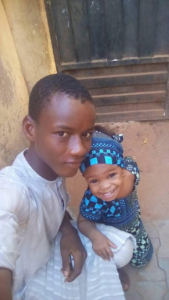
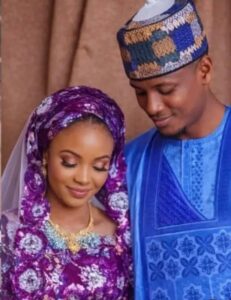
Reacting, one user wrote, “Fell in love from the day she was born? That sentence alone is wild.” Another commented, “People should calm down. Cousin marriage is normal in many cultures.”
Despite the mixed reactions, the man appears unfazed, celebrating what he describes as a 17-year journey of love that eventually led to marriage.
Check post below….

-
Business1 year ago
US court acquits Air Peace boss, slams Mayfield $4000 fine
-

 Trending1 year ago
Trending1 year agoNYA demands release of ‘abducted’ Imo chairman, preaches good governance
-

 Politics1 year ago
Politics1 year agoMexico’s new president causes concern just weeks before the US elections
-

 Politics1 year ago
Politics1 year agoPutin invites 20 world leaders
-

 Politics1 year ago
Politics1 year agoRussia bans imports of agro-products from Kazakhstan after refusal to join BRICS
-
Entertainment1 year ago
Bobrisky falls ill in police custody, rushed to hospital
-
Entertainment1 year ago
Bobrisky transferred from Immigration to FCID, spends night behind bars
-
Education1 year ago
GOVERNOR FUBARA APPOINTS COUNCIL MEMBERS FOR KEN SARO-WIWA POLYTECHNIC BORI

